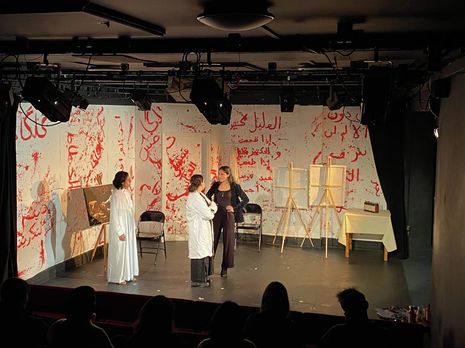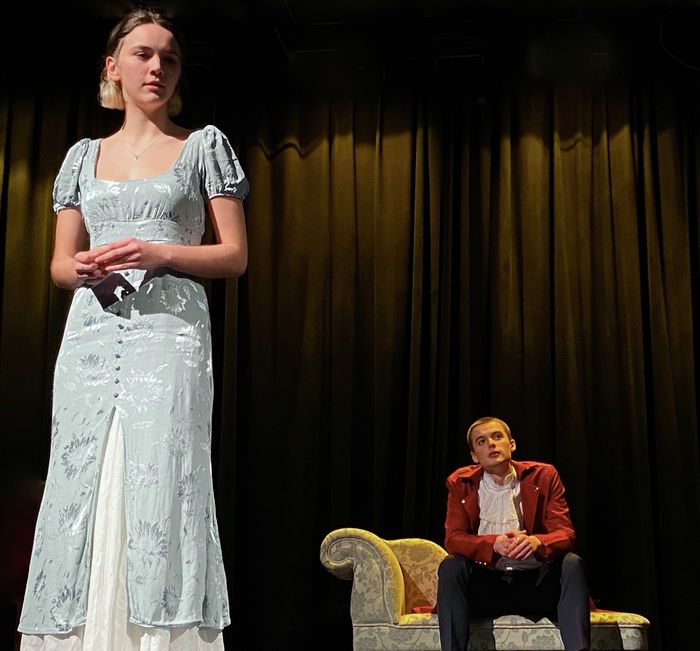The Calligrapher is a provocative performance that inscribes itself on the mind
Jasmine Regan Feldman is captivated by this student-written Corpus mainshow

An aggressive and confrontational set has been splashed across the Corpus Playroom stage for this week’s run of the student-written play The Calligrapher. Frightfully scrawled across the walls of the corner set are Arabic words from the Quran - but is the scarlet colour paint or blood? The blank canvases and messy palettes would surely hint at the former, yet Caravaggio’s Judith Slaying Holofernes, propped centrally, alludes to a far darker intent behind the inking of these holy words.
“I found the writing to be extremely emotive and raw”
Abraham Alsalihi’s student drama follows Haytham (Dounia El Barhdadi), an art restorer now living in the States, but deeply haunted by his past. Originally from Iraq, Haytham prides himself on his skill and artistry as a calligrapher, having written out some of the most beautiful Qurans in existence. But at every turn and thought, a figure in white interrupts him, reminding him of his most heinous sin. For Saddam Hussein, Haytham created his most intricate and exquisite Quran that is shunned by all Muslims and artists alike, for he wrote it in blood. Alsalihi explores the purpose of curating the dark artefacts that fill our history and the pain and conflict faced by modern Iraqis in his play The Calligrapher.
The Calligrapher is told through largely long, dialogue-heavy scenes and, while there is a lot of ‘telling’ rather than ‘showing’, I found the writing to be extremely emotive and raw. Alsalihi has, however, something of a tendency to linger just a bit too long on a scene, leading to a slightly sluggish feel towards the end of the play. This is not a major critique of his writing, which is mostly extremely heart-felt – perhaps the tendency to labour the point comes from an emotional place where he wants to ensure the audience truly appreciates the gravity of his themes. The ending of The Calligrapher is one of the darker I’ve seen on Cambridge stages, and tightening up some of the final scenes would only enhance the sincerity and gravitas of the play.
El Barhadi’s performance as Haytham was bewitching to watch as she crafted the internally tortured man. Haytham is torn between his duties as a father, his role as an artist, and his complicated love for his religion and country. Vidya Divakaran plays the personification of Haytham’s haunted past. At first, the audience sees her as the voice of Haytham’s religious guilt, chastising him for his sins, but soon we realise she is far more than the angel counterpart of the devil on his shoulders. Divakaran deftly takes the character from being a mildly irritating holier-than-thou presence guilting Haytham, to a gentle and loving voice attempting to reason with Haytham’s quick anger and cruelty towards his son Ahmed (Kush Melwani).
“Alsalihi skilfully crafts his play in a very sensitive portrayal of the hard-hitting themes”
It was interesting to watch Alsalihi’s portrayal of Haytham and Ahmed’s father-son relationship, complicated by conflicting morals and clashes in religious interpretation. Ahmed has grown up in the US, and so struggles to see eye-to-eye with Haytham’s more stringent, yet hypocritical, practices. The introduction of the morally-grey American collector, played by Anjeli Chapman, epitomises all that is wrong with the fine art and artefact market. By representing the dark connections between the US and Iraq, Alsalihi demonstrates there can be no righteous superiority between Haytham and Ahmed as their cultures share bloodied histories.
Judging by the reactions of the audience as we left the Corpus Playroom, people were quite stunned at the content of the play. The Calligrapher deals with some very difficult and controversial points in history, but Alsalihi skilfully crafts his play in a very sensitive portrayal of the hard-hitting themes. Lise Delamarre and Francesca Mann, director and producer, translated the writing beautifully on stage, creating a detailed and interesting performance that enhanced Alsalihi’s story. The Calligrapher runs at the Corpus Playroom until the 19th of February and is worth the almost 2-hour runtime to experience one of Cambridge’s most provocative new plays.
 News / Clare Hall spent over £500k opposing busway 24 December 2025
News / Clare Hall spent over £500k opposing busway 24 December 2025 Comment / The ‘class’ of Cambridge24 December 2025
Comment / The ‘class’ of Cambridge24 December 2025 News / Caius mourns its tree-mendous loss23 December 2025
News / Caius mourns its tree-mendous loss23 December 2025 Comment / Yes, I’m brown – but I have more important things to say22 December 2025
Comment / Yes, I’m brown – but I have more important things to say22 December 2025 News / Girton JCR publishes open letter expressing solidarity with Palestine25 December 2025
News / Girton JCR publishes open letter expressing solidarity with Palestine25 December 2025










